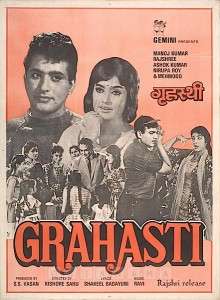
Grahasti (1963 film)
Grahasti (Family Life) also called Grihasti, is a 1963 Hindi family drama film, directed by Kishore Sahu. Produced by S. S. Vasan for Gemini Studios (Gemini Chitra, Chennai), its music director was Ravi and the lyrics were written by Shakeel Badayuni. Pandit Mukhram Sharma wrote the dialogues with cinematography by P. Ellappa. The film starred Ashok Kumar, Manoj Kumar, Rajshree, Nirupa Roy, Indrani Mukherjee, Bipin Gupta, Lalita Pawar, and Gajanan Jagirdar.
Grahasti was the first film to "start the trend" of family dramas being made in South India. The story revolves around Harish Khanna (Ashok Kumar) who leads a dual life, having two sets of families in different cities. The effect the exposure has on him and his family forms the basis of the story.
Plot
Harish Khanna (Ashok Kumar) lives in a happy household consisting of his wife Maya (Nirupa Roy) and his large family of seven daughters and one son. Also staying with them is his widowed sister (Lalita Pawar), and her son Jaggu (Mehmood). Harish spends four days of the week away from his family for work. Harish and Maya soon have a ninth child much to Maya's consternation, as her older daughter, Kamla (Bharati Malvankar) who is married to Gopal is also expecting a child. The fact that Kamla is pregnant is a cause of anxiety, as according to Gopal's parents, the couple have not been together since the wedding and her pregnancy is considered as a sign of her disreputable character. Gopal is not there to give an explanation and his parents decide to send Harish's older daughter back home. Harish finds out that two of his daughters, Kiran (Rajshree) and Kamini (Indrani Mukherjee) are in love with Mohan (Manoj Kumar), the son of the College principal, and Ravindra (Soodesh Kumar) respectively, and that Jaggu is in love with Rekha (Shobha Khote). Harish decides to get the three pairs married.

1963 in film
The year 1963 in film involved some significant events, including the big-budget epic Cleopatra and two films with all-star casts, How the West Was Won and It's a Mad, Mad, Mad, Mad World.
Events
Film (band)
Film was a Yugoslav rock group founded in 1978 in Zagreb. Film was one of the most popular rock groups of the former Yugoslav new wave in the late 1970s to early 1980s.
History
New wave years (1979-1981)
During 1977 and 1978, bassist Marino Pelajić, guitarist Mladen Jurčić, and drummer Branko Hromatko were Azra members when Branimir "Johnny" Štulić brought Jura Stublić as the new vocalist. Stublić was to become Aerodrom member, but due to his deep vocals it never happened. The lineup functioned for a few months only and after a quarrel with Štulić, on early 1979, Pelajić, Jurčić, Hromatko and Stublić formed the band Šporko Šalaporko i Negove Žaluzine, naming the band after a story from the "Polet" youth magazine, which was soon after renamed to Film. The memories of the Azra lineup later inspired Štulić to write the song "Roll over Jura" released on Filigranski pločnici in 1982.
Saxophonist Jurij Novoselić, who at the time had worked under the pseudonym Kuzma Videosex, joined the band, inspiring others to use pseudonym instead of their original names: vocalist Stublić became Jura Jupiter, bassist Pelajić became Mario Baraccuda and guitarist Jurčić became Max Wilson. Before joining the band, Stublić did not have much experience as a vocalist, however, since his father had been an opera singer, he often visited the theatre and opera, and at the age of 13, he started playing the guitar, earning money as a street performer at seaside resorts.
Film (Iranian magazine)
Film (Persian:فیلم) is an Iranian film review magazine published for more than 30 years. The head-editor is Massoud Mehrabi.
References
External links

Film (film)
Film is a 1965 film written by Samuel Beckett, his only screenplay. It was commissioned by Barney Rosset of Grove Press. Writing began on 5 April 1963 with a first draft completed within four days. A second draft was produced by 22 May and a forty-leaf shooting script followed thereafter. It was filmed in New York in July 1964.
Beckett’s original choice for the lead – referred to only as “O” – was Charlie Chaplin, but his script never reached him. Both Beckett and the director Alan Schneider were interested in Zero Mostel and Jack MacGowran. However, the former was unavailable and the latter, who accepted at first, became unavailable due to his role in a "Hollywood epic." Beckett then suggested Buster Keaton. Schneider promptly flew to Los Angeles and persuaded Keaton to accept the role along with "a handsome fee for less than three weeks' work."James Karen, who was to have a small part in the film, also encouraged Schneider to contact Keaton.
The filmed version differs from Beckett's original script but with his approval since he was on set all the time, this being his only visit to the United States. The script printed in Collected Shorter Plays of Samuel Beckett (Faber and Faber, 1984) states:
Podcasts:

